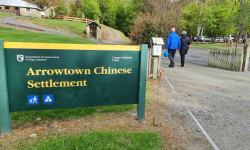
An ‘updraft’ in meteorology characterises a storm’s early development as warm air rises, eventually bringing the rains that offer sustenance and life. Rick’s hope for this monthly updraft column is for it to be a catalyst for change, ultimately contributing to the transformation of our faith communities. This regular column first appears in the Northern Baptist Association monthly newsletter, ‘Northern Lights’.
In last month’s edition of Updraft, we talked about culture change. You can check it out here. Whilst changing culture is often a slow and, at times, painful journey, the significant Christian events we remember over Easter remind us of the hope we have for transformation. Even in death, there is hope of life. Even in brokenness, there is hope of wholeness. Even in the old, there is hope of the new.
As our Baptist collective of faith communities looks to be bringing gospel renewal to people and places in our local neighbourhoods, we must have the courage to look at our culture. Is the existing culture (following our understanding from last month as the ‘way’ we do things and the ‘why’ we do things the way we do) aligned with an experience of gospel renewal in our faith communities? Are we experiencing God’s transforming grace, love and life overflowing into our faith community culture, characterised by a sense of belonging, acceptance, and love for one another? How are we making that love visible and known to our wider local community and the world?
In a time when there is much division, brokenness, and strife in society, our world needs the church to be demonstrating, through its life together, God’s grace, love, and life. The world needs to see the gospel message lived out in a way that reconciles, restores and renews, igniting hope for a transformed future. As we’ll see, that comes about through a community fulfilling the two great commandments.
In reflecting on the events of Passion Week, the week leading up to Jesus’ arrest, crucifixion, and ultimate resurrection, we see an occasion when Jesus is questioned about the most important commandment. He responds with this: ‘Love the Lord your God, with all your heart and with all your soul and with all your mind, and with all your strength. The second is this: Love your neighbour as yourself. There is no commandment greater than these.’ (Mark 12:29-31).
Looking at other stories in Passion Week, we see at least two ‘laying-down’ movements demonstrating an outworking of these great commandments. The first ‘laying-down’ movement is in Mark 14:3, ‘[while Jesus] was in Bethany, reclining at the table in the home of a man known as Simon the Leper, a woman [Mary] came with an alabaster jar of very expensive perfume, made of pure nard. She broke the jar and poured the perfume on his head.’ Here, we see Mary laying down earthly possessions in her act of genuine devotion and love of Jesus, anointing him for his burial - an act of love which evidences the first great commandment.
The second ‘laying-down’ movement is in John 13:1-5, ‘It was just before the Passover Feast. Jesus knew that the time had come to leave this world and go to the Father. Having loved his own who were in the world, he now showed them the full extent of his love…[Jesus] got up from the meal, took off his outer clothing, and wrapped a towel around his waist. After that, he poured water into a basin and began to wash his disciples’ feet, drying them with the towel that was wrapped around him.’ In this laying-down’ movement we see Jesus, the one who had all things under his power, humbly lay down his power, position, and identity in an act of servanthood that reveals deep, deep love. This act wholeheartedly demonstrates the second great commandment.
Not following these laying-down movements can prevent us from truly loving God and others as we love ourselves. Jesus said to his disciples in John 15:12, ‘Love each other as I have loved you. Greater love has no one than this, that he lay down his life for his friends.’ If we’re to make visible that incredible depth of love and devotion for God and offer that kind of love to one another, we also need to be willing to lay down our earthly possessions, our power, our position, our very lives, in the love of God and of others. This love and this willingness to lay things down must become our way of doing things. It must become our culture.
The events of Easter again remind us of the hope for transformation. As a faith community, do we have a culture of growing in love for God? How is our experience of his love and grace transforming the way we love one another (recognising we can only be offering love to others to the extent that we are experiencing love in our relationship with God - we’re unable to pour out what we don’t experience within)? What do we need to be laying down to demonstrate our devotion and love of God and one another?
Our world today needs loving. Will the church lay down its earthly possessions, power, and position and offer God’s love to one another and the world? Our hopes for seeing gospel renewal need to be intricately woven into our culture. May we have the courage to live so!


